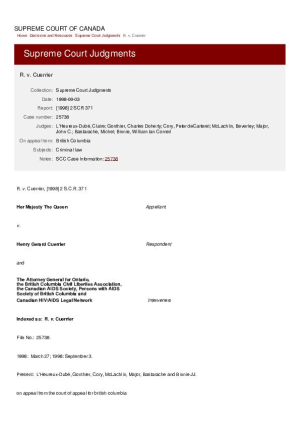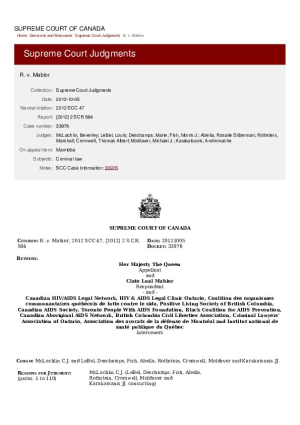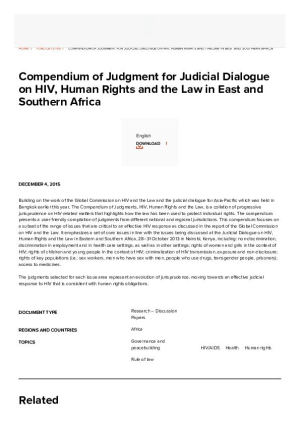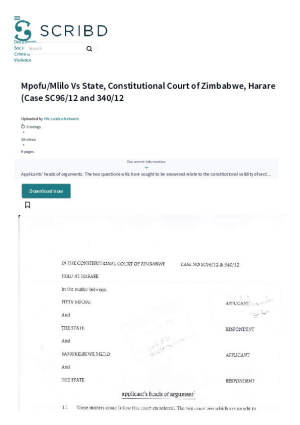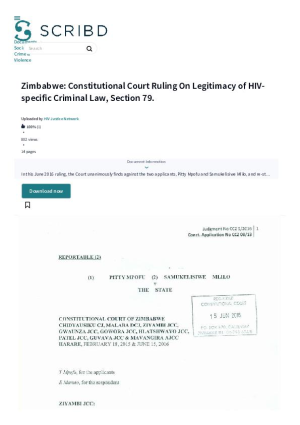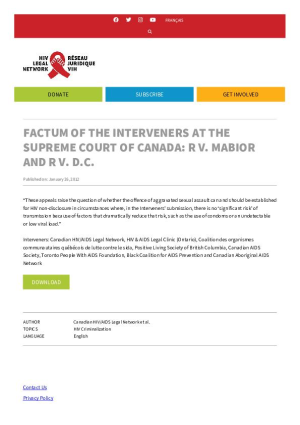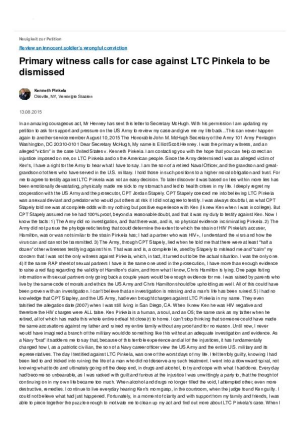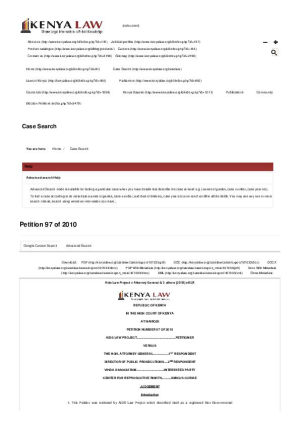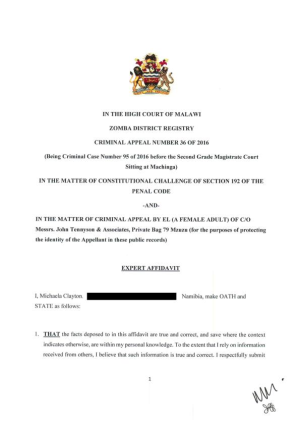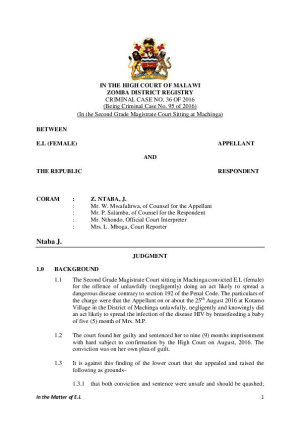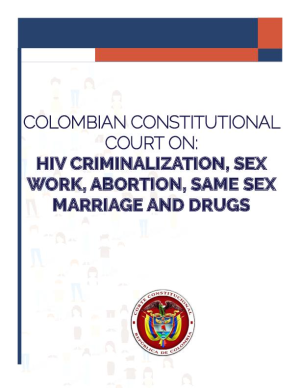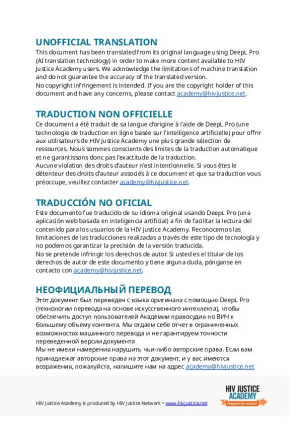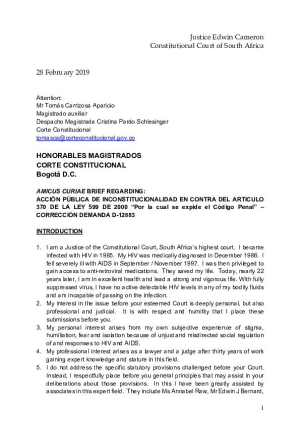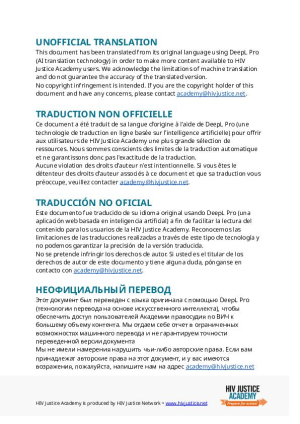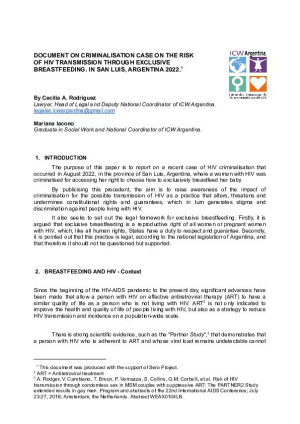Clarifies that recklessness regarding HIV transmission risk is not the same as intention to transmit HIV. This ruling means that if people are convicted of having sex without disclosing their HIV status, they will be convicted of lesser charges with lower penalty.
Law, cases and legal analysis
Court rulings and third parties submissions
New Zealand Police v Justin William Dalley
Clarifies that use of a condom satisfies the requirement to take ‘reasonable care’ to prevent HIV transmission during vaginal sex, and that ‘failsafe’ precautions are not required by law. Also finds that oral sex without a condom (and without ejaculation) satisfies the standard of ‘reasonable care and precautions’. This ruling means that disclosure of HIV status before vaginal sex is not required as long as a condom is used. Disclosure before oral sex is not required.
Her Majesty the Queen v. Henry Gerald Cuerrier
Ruling that failure to disclose HIV status constitutes fraud. Consequently, a partner’s consent to unprotected sexual activity is not valid. This ruling allows people with HIV in Canada who do not disclose their HIV-status before sex to be prosecuted under sexual assault laws.
R. v. Mabior
Ruling on "significant risk of bodily harm" which ostensibly found that people with HIV in Canada do not need to disclose their HIV-status before sex only if (i) the accused’s viral load at the time of sexual relations was low, and (ii) condom protection was used.
The Compendium of Judgments, HIV, Human Rights and the Law
Includes judgements from jurisdictions around the world, representing enabling jurisprudence on HIV-related issues, including judgements related to the criminalization of HIV transmission, exposure and non-disclosure.
Mpofu/Mlilo vs State, Constitutional Court of Zimbabwe
Challenges Section 79 of the Zimbabwe Criminal Law (Codification and Reform) Act 23 of 2004, with the court deciding the provision was overly broad and unconstitutionally vague.
Pity Mpofu Samukelisiwe Mlilo v The State, Consitutional Court of Zimbabwe
On appeal, the Consitutional Court of Zimbabwe decided the only defence to prosecution is disclosure of known or potential HIV infection and suggested people with HIV can be discriminated against by the law if the reason is to protect public health.
Factum of the Interveners at the Supreme Court of Canada: R v. Mabior and R v. D.C.
Questions whether the offence of aggravated sexual assault can and should be established for HIV non-disclosure in circumstances where, in the Interveners’ submission, there is no “significant risk” of transmission because of factors that dramatically reduce that risk, such as the use of condoms or an undetectable or low viral load
Amicus Curiae brief of Lambda Legal Defense and Education Fund, Inc., Community AIDS Resource and Education Services, Michigan Positive Action Coalition, and Michigan Protection and Advocacy Service Inc.
Urges court to drop a bioterrorism charge against an HIV positive man who bit his neighbour during an argument, explaining the facts about HIV transmission risk. The bioterrorism charges were dropped.
Brief Amicus Curiae of American Academy of HIV Medicine, Association of Nurses in AIDS Care, Center for HIV Law and Policy, HIV Medicine Association, and Lambda Legal Defense and Education Fund Inc., in Support of Defendant-Appellant David Plunkett
Principle witness requests that testimony be withdrawn and that the case be reviewed.
Judgment On Section 24 Of The HIV and AIDS Prevention and Control Act
Outlines the AIDS Law Project’s suit (Petition No. 97 of 2010) against the Attorney General and Director of Public Prosecutions regarding the constitutionality of section 24 of HIV and AIDS Prevention and Control Act. The court found that some terms were too broadly defined and that Act contravened Kenya’s constitution.
Expert affidavit in E.L. case on breastfeeding risk
Affidavit provided to the High Court from Dr Ruth M Bland, a medical expert with extensive expertise in conducting research in the field of HIV transmission, concluding that in her expert opinion in the case of E.L. the risk of HIV transmission to the child after a single exposure of breast milk whilst on ART is "infinitesimally small".
Expert affidavit in E.L. case on the impact of laws applied to criminalise HIV transmission or exposure
Affidavit provided to the High Court from Michaela Clayton, a human rights lawyer with extensive expertise in HIV/AIDS and human rights issues, concluding that, in her expert opinion, HIV criminalisation was unlikely to prevent new infections or reduce women's vulnerability to HIV but could in fact harm women rather than assist them, and also may negatively impact both public health and human rights.
- Alternative links
- Traduction française automatisée
E.L. Judgement, Malawi High Court (2016)
On 19 January 2017, the Zomba High Court in Malawi delivered a landmark ruling on the application of criminal law to cases of HIV transmission and exposure through breastfeeding.
The appellant was a woman living with HIV who was convicted of negligently and recklessly doing an act which is “likely to spread the infection of any disease which is dangerous to life” under section 192 of the Malawi Penal Code for accidentally breastfeeding another person’s child. She was unrepresented at her trial and sentenced to nine months’ imprisonment.
Before the High Court, she appealed her conviction and sentence and challenged the constitutionality of section 192 of the Penal Code for being vague and overbroad. She raised expert evidence to show the “infinitesimally small risk” of HIV transmission by women on antiretroviral treatment through breastfeeding. The State agreed that the appellant’s conviction and sentence should be overturned and set aside.
At the hearing on 2 December 2016, the Court, per Ntaba J, granted an order that the appellant’s identity be concealed to protect her confidentiality and that of the children concerned.
On 19 January 2017, the High Court acquitted the appellant and ordered her immediate release. It held that the proceedings in the trial court were irregular and “blatantly bias” against the appellant, compromising her right to a fair trial. The Court held that the appellant did not have the requisite knowledge or belief that breastfeeding the complainant’s child was likely to spread HIV and cautioned against the misapplication of criminal law in cases of HIV transmission and exposure. The Court recommended the constitutional challenge be filed for separate determination considering the national interest in the issue.
The appellant was represented by Mr Wesley Mwafulirwa of John Tennyson Associates.
- Alternative links
- HJN feature on the impact of this case, SALC resources on this case
Semba Judgement, High Court of Zimbabwe (2015)
Judge Charles Hungwe's reasoning that allowed the appeal on behalf of a 26 year old woman, was charged with the crime of deliberate transmission of human immunodeficiency virus (“HIV”) as defined in s 79 (1) (a) of the Criminal Law Code for briefly mistakenly breastfeeding another woman's baby.
The judgement found that the prosecution was "ill-conceived as the legislature did not intend that breast-feeding by infected but ignorant women be criminalised. In any event there was no proof that the appellant fully appreciated that her conduct would result in HIV transmission. In the result she was entitled to an acquittal at her trial."
- Alternative links
- Traduction française automatisée, Brief news story on post-appeal aquittal
Colombian Constitutional Court on: HIV Criminalization, Sex Work, Abortion, Same Sex Marriage and Drugs
This document presents some of the most relevant and recent decisions in which the Court has discussed the limits to individual liberty, autonomy and privacy among issues concerning matters like: (i) HIV criminalization and other protections; (ii) sex work; (iii) abortion or voluntary interruption of pregnancy; (iv) rights of same sex couples to marriage; and, (v) personal drug possession and consumption.
Judgment C-248/19 – Lawsuit challenging the constitutionality of Article 370 of Law 599 of 2000 “Whereby the Criminal Code is issued.”
The decision of the Constitutional Court of Colombia to eliminate section 370 of the criminal code that criminalised the transmission of HIV.
Supreme Court, Second Chamber, Criminal Division, Judgment 690/2019 of 11 Mar. 2020, Rec. 1807/2018
INJURY. Transmission of HIV in cases in which the infected person knew of his partner's disease. The complainant knew that her partner was a carrier of HIV, so having agreed to have sex with him, without any kind of prophylaxis, the transmission of the disease is not worthy of criminal reproach. External evidence of the disease that the complainant had to perceive, since she herself was diagnosed months later, and neither after this diagnosis, nor when she denounced an alleged aggression, did she make any allusion to the contagion of the disease. In dubio pro reo. Self endangerment of the complainant herself.
The SC dismissed the appeal filed against the sentence of the AP Madrid and confirmed the conviction for the crime of aggravated injury due to HIV infection.
This document has been translated from its original language using DeepL Pro (AI translation technology) in order to make more content available to HIV Justice Academy users. We acknowledge the limitations of machine translation and do not guarantee the accuracy of the translated version.
Constitutional Court of South Africa – Amicus Curiae Brief – Justice Edwin Cameron
Amicus Curiae Brief regarding the Public Action of Constitutional Challenge against Article 370 of Law 599 from 2000.
Supreme Court of Finland R2012/1093 – KKO:2015:83
A, aware of his HIV infection, had several times unprotected anal sex with B without telling him about his illness. B had not been infected with HIV. The question of whether A had caused a serious danger to B's life or health.
This document has been translated from its original language using DeepL Pro (AI translation technology) in order to make more content available to HIV Justice Academy users. We acknowledge the limitations of machine translation and do not guarantee the accuracy of the translated version.
Original text is available at https://finlex.fi/fi/oikeus/kko/kko/2015/20150083
Document on criminalisation case on the risk of HIV transmission through exclusive breastfeeding
The purpose of this paper is to report on a recent case of HIV criminalisation that occurred in August 2022, in the province of San Luis, Argentina, where a woman with HIV was criminalised for accessing her right to choose how to exclusively breastfeed her baby.
Please note this is a DEEPL translation of the Spanish report.



